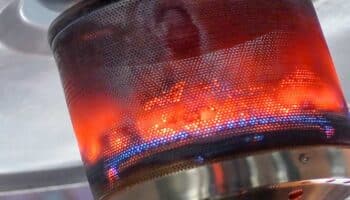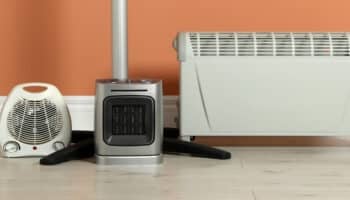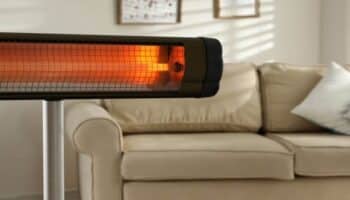We've independently reviewed this article to make sure it's as accurate as we can make it.
To find out more about our article creation and review process, check out our editorial guidelines.
Are you having a hard time comparing electric vs propane patio heaters?
Honestly, I’m not surprised. Thousands of people find themselves in the same situation when looking for a new patio heater for their home.
Although all patio heaters do the same thing, they’re not created equal.
The 6 main elements to consider when comparing electric vs propane patio heaters are their safety, heating power, durability, price, reliability, and portability.
Keep reading to learn more about the main differences between electric and propane patio heaters to make the right choice!
Electric vs Propane Patio Heaters Pros & Cons
Before analyzing these appliances under different categories, it’s important to look at what each model does right, and where there’s room for improvement.
Let’s start off with electric patio heaters:
Electric Patio Heaters
These heaters use electromagnetic waves to heat objects or people, which is a great way to stay warm even if there’s a lot of wind.
They’re safe to use around kids, as there’s no fire involved. Moreover, they’re easy to install and use, and they can even be mounted on walls, which is a great way to save space.
However, there are other characteristics that you might want to take into consideration before buying an electric patio heater.
This is why, below, I’ve prepared a list including all the pros and cons of these heaters:
| Pros | Cons |
| No complicated setup | Higher electricity bills |
| Safe to use | Highly dependent on electrical outlets |
| Much more efficient than propane heaters | Vulnerable to blackouts |
| Ease of use | |
| Low maintenance | |
| Can be mounted on walls/ceilings | |
| No need to replace canisters |
As you can see, there are certainly some advantages and disadvantages to choosing an electric patio heater over a propane one. However, the latter also has its own strengths and weaknesses.
Propane Patio Heaters
These heaters not only allow you to enjoy a late-night get-together with friends, but they’re also affordable.
They don’t depend on electricity and are great for heating big areas. They’re also very portable because they come with gas cylinders, which make it possible to move them.
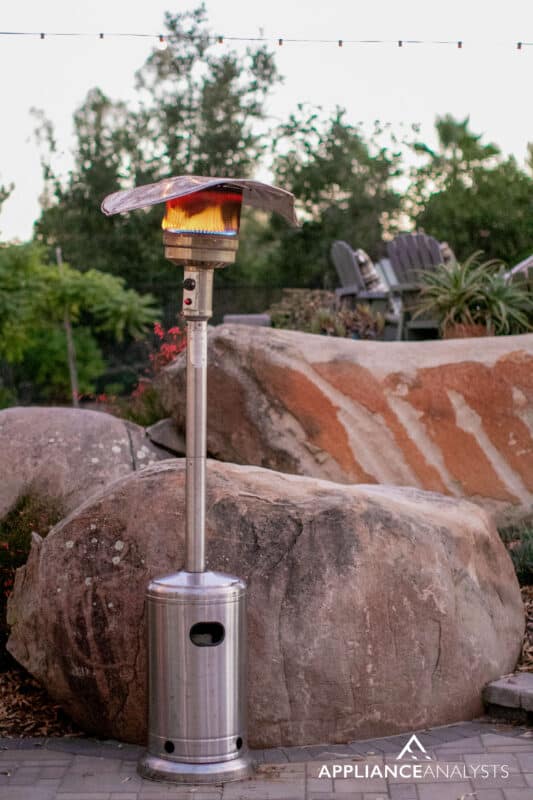
But, there are other pros and cons that you might want to take into consideration before making a decision. These are:
| Pros | Cons |
| Not electricity-dependent | Canister-dependent |
| Portable | They require ventilation |
| Immune to blackouts | May need to be installed by a technician |
| Great for colder nights | |
| Heats bigger areas | |
| Cheaper initial cost |
Now that we’ve established how both versions stack up against each other in general aspects, we can focus on the specifics.
Comparing Propane vs Electric Patio Heaters
#1 Heating Power
Electric heaters harness almost all the energy they consume
This, along with the price, is probably one of the things most people tend to look at first.
And why wouldn’t they? After all, while safety and durability are important, if you’re buying a heating appliance, making sure that it heats well, should always be your top priority.
Now, let me tell you straight away that both models will heat up your living spaces just fine, the main difference will lie in heat efficiency.
If you’re not sure what this means, let me briefly explain.
Heat efficiency can be understood as how well the amount of heat the appliance generates actually gets to the air it’s trying to warm up. Think of it as pouring a glass of water from a jar.
You’d have 100% pouring efficiency if all the water that left the jar, ended up filling the glass. However, this efficiency percentage would decrease with every droplet that ended up on your kitchen countertop, instead of inside the glass.
This same principle applies to patio heaters. And electric models take the cake. Nearly 100% of the heat generated by them ends up in the air and warms it up.
If you want to get the most heating from the energy consumed, your best bet is to go electric.
That being said, propane tends to give a much more powerful amount of heat. So even though it’s not the most efficient, it’s often better for those colder nights.
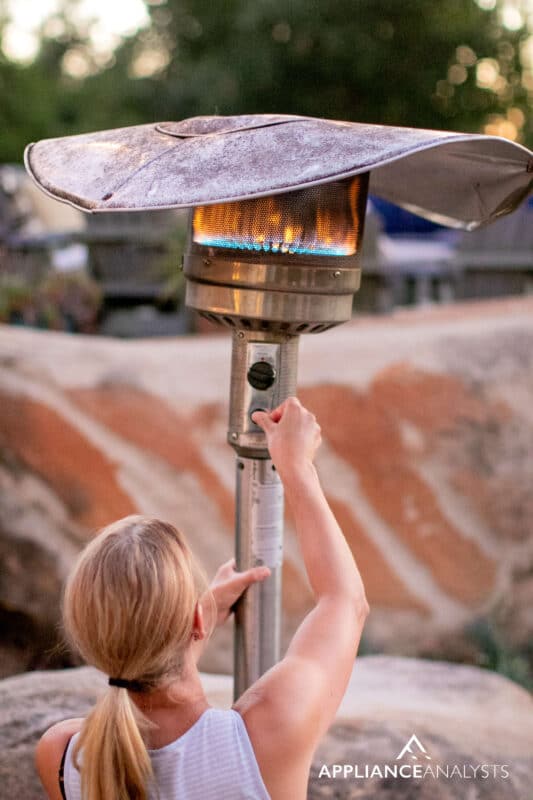
#2 Durability
Moving on to lifespan and component durability, you have to understand that we’re sort of comparing apples and oranges here.
Yes, both models are patio heaters, but the components inside them are very different. For example, while propane heaters rely on gas and fire to warm up the air, electric models utilize electricity, and a part called a heating element to get the job done.
Normally, propane patio heaters are much harder to maintain than their electric counterparts, as there are gas valves and pilots involved.
Moreover, with electric heaters, you only have to worry about the unit itself, whereas with propane models, you also have to look after the gas canister.
The bottom line is that, when properly maintained, both models should last about the same. However, propane heaters are much more likely to demand your attention frequently. They have a lot more parts and so a lot more things can go wrong.
If you hate having to constantly maintain an appliance and know you’re likely to neglect it, an electric patio heater should be your go-to.
#3 Safety
Both models are safe, but only one uses a live flame
At this point, electric patio heaters are starting to look like the clear winners of this comparison. And this key aspect might place them further ahead.
I’m going to tell you a harsh truth. Every appliance is somewhat dangerous if improperly maintained or operated. Having said that, the consequences of irresponsibility and neglect are much direr with certain machines.
When used according to your user manual and by following your manufacturer’s recommendations, both electric and propane models should provide you with years of faithful service.
That being said, fire is no joke.
While both models get incredibly hot in order to warm up the air in your living spaces, only one of them relies on fire to do so. Unfortunately, propane patio heaters put you at risk of gas leaks, fires, and even canister explosions.
You’ll also need to make sure (and have a measurement) that any gas heaters are ventilated properly.
Something you’ll never have to worry about with electric ones.
I’m not saying that this is an absolute certainty, though. In fact, there are several countermeasures built into propane heaters to keep this from happening. I’m just mentioning scenarios that are possible, but not probable.
#4 Price
You should always consider the collateral costs of each model
This one’s a draw.
Just as it happens with all household appliances, you can find both patio heater models in every price range. If you’re only looking for something simple, you can get either technology for under $250. And if you want as many extra bells and whistles as possible, you can also find models upwards of $1000.
Being so similar, when it comes to comparing either version’s prices, you don’t want to look only at the appliance’s price tag, but at the additional costs as well.
Maintenance, replacement parts, and energy costs (propane gas & electricity) should always be taken into consideration.
You might buy the most amazing electric patio heater on clearance, thinking you got the deal of a lifetime. But if you live in an area where electricity is very expensive, you might end up paying a fortune every month.
And the same goes for repairs in propane models. You might be tempted to stay away from electric heaters due to your area’s electricity costs. But if you fail to clean your pilot, gas line, and thermocouple often, you could burn a hole in your pocket with the cost of repairs and labor.
#5 Reliability
Ok, let’s talk reliability.
If I were to put this into a dictionary definition, I’d say it’s how likely your appliance is to malfunction or fail to do its job well. And by those standards, I’m happy to tell you either model will pass the test with flying colors.
As long as you buy your patio heater from a reputable vendor, you should be able to enjoy the benefits of your new purchase uninterrupted. However, it’s very important to keep your eyes open for knockoffs, as they’re getting very good these days.
No matter how great a deal an off-brand appliance might seem to be, stay away from spending your hard-earned money on it. Remember, buy cheap, buy twice.
Now, going back to original, high-quality products, let me assure you that, the way in which you care for your appliance will have a much greater impact on its functionality, than anything else.
Regardless of the lifespan, your manufacturer might claim its product to have, it will be very difficult for it to last as long if you neglect it.
This brings us back to durability.
A propane patio heater will require much more of your attention than an electric patio heater. The former will need you to clean its components, check its gas line, and replace its canisters often. Whereas the latter will just need you to pay the utility bill on time.
You’re much more likely to be stuck with a heatless propane heater because you forgot to replace the canister than you are to have the same problem with your electric model because you forgot to plug it in.
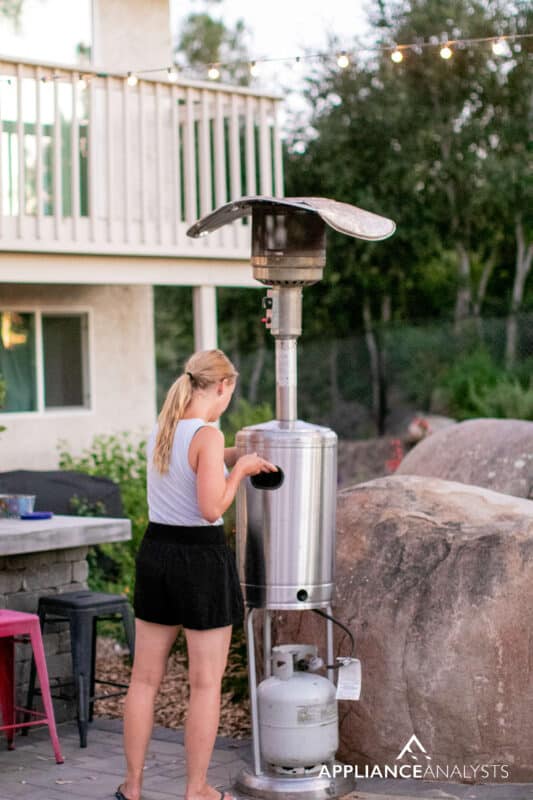
#6 Portability
Electric heaters might put you in a complicated position
Last, but definitely not least, is portability.
One of the most attractive features of patio heaters is that you can place them virtually anywhere to heat up an area.
Your room is too cold? No problem! You’re having a family picnic in the garden, but it’s 40 °F outside? It doesn’t matter. Your patio heater can follow you anywhere.
Well, propane heaters can.
You see, as wonderful as electric heaters are, they depend greatly on wall outlets, and other electrical power sources to function. Owning one of these models will liberate you from the hassle of continuous appliance maintenance, but also restrain your area of mobility.
Needing an outlet to power your heater can be inconvenient. Especially in the garden, where these electricity sources are scarce. Sometimes, you’ll have to decide between charging your phone and staying warm.
Which One Is Best for You?
In summary, electric patio heaters are best for their ease of use and low maintenance. They’re also safer to use around kids, they can be mounted on walls/ceilings, and there’s no need to replace canisters.
Propane patio heaters, on the other hand, are best for those with higher winds and bigger areas. Their initial cost is cheaper, and they’re immune to blackouts.
At the end of the day, you should go for the model that makes the most sense to you after considering all the important factors around this decision.
Conclusion
As technology progresses, the options at our disposal grow. And while this sounds like a good thing, sometimes, it can be a double-edged sword.
It can be difficult to decide between an electric and a propane patio heater. Especially when they look and feel so similar. I hope this list has helped you understand how each technology works, and what are the pros and cons of each model.
Before making a costly decision, remember to keep your personal habits, and budget in mind, as well as the conditions in your area, and the price of utilities. Trust in yourself, and overanalyze if necessary.
I’m sure you’ll make the right choice in the end.
Thank you so much for sticking with me all the way to the end. If you found this article helpful, why not check out our other resources below?
Have a great day!
-Craig.
Frequently Asked Questions
How to Keep a Patio Heater Steady?
Under normal circumstances, the appliance should have a reservoir filled with water or sand at the bottom to keep it from tipping over. If your heater is wobbly, try screwing it onto your deck or tying it to a post with a strong rope (away from the flame, of course).
Now, these are just temporal home fixes. We do not recommend you do this unless it’s absolutely necessary. Please call an expert and have them refill the reservoir or find other safer, more permanent ways to deal with this issue.
Can I Use a Patio Heater on a Windy Day?
It’s not recommended. At least not for gas models.
Strong winds can blow the patio heater’s flame in the direction of flammable material, which could be a fire hazard.
Can I Use an Electric Patio Heater Indoors?
If it’s rated for indoor use, sure.
Most electric patio heaters are safe to use indoors, as there’s no open flame or gas canister producing toxic fumes. However, it’s always best to check your User Manual and follow your manufacturer’s instructions to stay safe.
What’s the Lifespan of a Patio Heater?
This depends greatly on the frequency of use.
Most high-quality patio heaters are rated to last up to 10,000 hours. So, if you were to use your appliance every day for about 6 hours, you’d be looking at a lifespan of around 4.5 years.





